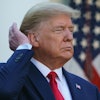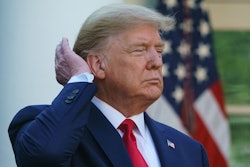When it comes to hot button issues, should institutional leaders speak out or remain neutral?
Earlier this week, Heterodox Academy (HxA) president Dr. John Tomasi moderated a discussion with Nadine Strossen, the John Marshall Harlan II Professor of Law Emerita at New York Law School and past President of the American Civil Liberties Union, and Dr. Keith Whittington, the William Nelson Cromwell Professor of Politics at Princeton University, in which they explored when it is appropriate for university presidents or leaders to issue statements on pressing issues and when it is best to remain neutral.![Screenshot 2023 10 25 151138[418248]](https://img.diverseeducation.com/files/base/diverse/all/image/2023/10/Screenshot_2023_10_25_151138_418248_.653ad4773907d.png?auto=format%2Ccompress&fit=max&q=70&w=400)
This discussion was driven by the October 7 Hamas terrorist attacks on Israeli citizens. Multiple university presidents issued public statements condemning the attacks. At Harvard and Cornell, there were then follow up statements.
Tomasi began the discussion by quoting from the Kalven Report on the University’s Role in Political and Social Action, issued in 1967, which remains relevant. “A university, if it is to be true to its faith in intellectual inquiry, must embrace, be hospitable to, and encourage the widest diversity of views within its own community,” read the report.
“There is a long history of university leaders not being neutral,” noted Tomasi. “In recent years, there has been a steady increase in presidential statements on controversial topics: gun control, climate change, a Republican winning a Presidential election, a Democrat losing that same Presidential election, Charlottesville, the police killing of George Floyd, the Russian invasion of Ukraine, a Supreme Court decision about abortion, another decision about college admissions and more.”
Tomasi said the presidents who issued statements on the October 7th attacks, often issued clarifying statements and some issued apologies. “A few university presidents announced their newfound, perhaps, commitment to neutrality,” he said.
The Kalven Report noted that a university’s mission is “the discovery, improvement and dissemination of knowledge.” It also indicated that there are times when it is appropriate to react, and those are when the “very mission of the university and its values of free inquiry” are impacted.
Key issues that Strossen and Whittington identified are that statements lead to more statements. As universities follow such a path, an increasing number of people will be alienated. The position maintained throughout the discussion is that neutrality by institutional leadership is the appropriate path unless the institution is directly impacted by the events or issues on which they are commenting.
“We should be trying to calm the political waters rather than turn them up, which means in part that our university leaders really need to be trying to turn down the heat on the institutions and to emphasize that we have lots of people on campus with lots of different opinions, and we want to provide platforms for them to be able to speak out,” said Whittington.
This approach fosters academic freedom, Whittington said. If a faculty member holds a position different than leadership, he or she may feel at risk of not receiving tenure or being promoted if he or she offers an opinion. If the institution provides the opportunity to speak freely about the issues, that supports the institutional mission of inquiry and information.
The Kalven Report clearly stated that a university should not be a source of political values because that “will impair its integrity as a home of intellectual freedom.”
When individuals speak out, they should make clear they are not speaking for the university as a whole, Strossen said, adding that if the university wants to distance itself from an individual’s statement, it shouldn’t name the person who made the statement, so as not to stigmatize that person. “One of the pragmatic benefits of institutional neutrality is reducing the controversy, quelling it as opposed to stirring it up,” she said.
Strossen also referenced the Princeton Principles for a Campus Culture of Free Inquiry developed recently, which noted that leadership comments should be limited to specific issues that directly, tangibly affect the university. This would include something specifically related to the campus or the institution’s core mission.
“Try to keep things as focused on your own campus as possible and as much closely tied to your own policy as possible,” said Whittington. “If there are things where you need to tell the student body, ‘We have resources to help you in this moment.’ Or if you have threats that are occurring on your campus to emphasize, ‘We don’t tolerate threats and we’re going to take steps to deal with those.’ That’s helpful and productive.”
Panelists agreed that national issues that impact students, faculty and staff, such as President Trump's decision to issue an executive order limiting immigration from Muslim nations or the recent Supreme Court decision on affirmative action in admissions, which runs counter to the policies at many institutions, might warrant a presidential statement.
“Because they affect diversity and university policy quite directly, it’s going to be incumbent for the university to have a position on them because they have to react to it and think through what are the implications on our own policy making,” Whittington said. “The goal here would be for the universities to speak as directly as possible about its own decision-making and internal operations and try to avoid broad statements about the nature of the policy more generally.”


















